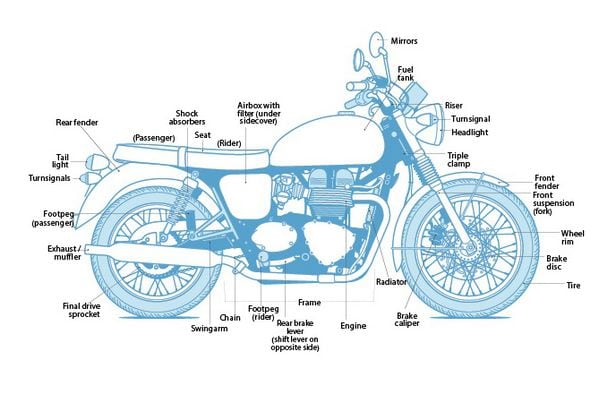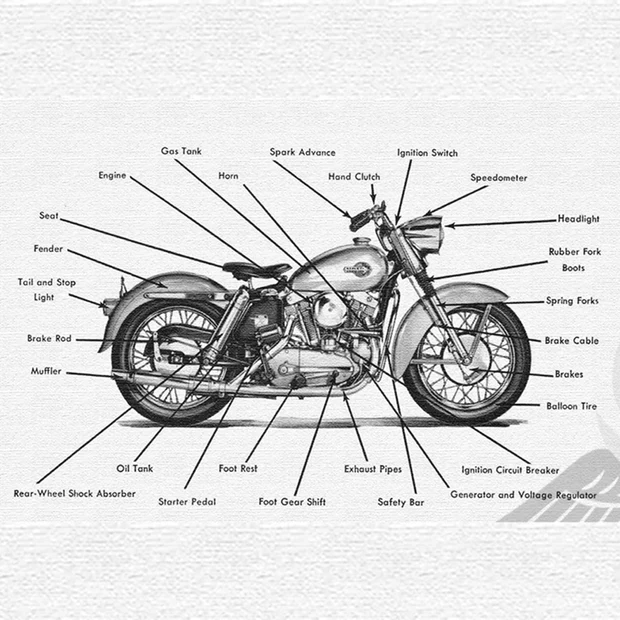Your Questions Solved About Ordering Motorcycle Spares Christchurch Online
Wiki Article
Discover the Necessary MotorBike Components You Need for Optimum Efficiency
Understanding the important components of a motorcycle is essential for achieving peak efficiency. Each component, from the engine to the stopping system, plays a critical function in overall functionality and safety. Regular upkeep can avoid unexpected failings and boost the riding experience. Nevertheless, lots of riders forget the details of these systems. Finding how they interact can result in a much more efficient adventure. What essential components should every rider focus on?The Engine: The Heart of Your Motorcycle
The engine functions as the core part of a motorbike, driving its performance and defining its capabilities. It is accountable for converting gas into mechanical power, which powers the bike onward. Various kinds of engines are employed, including single-cylinder, V-twin, and inline setups, each offering distinct attributes fit for different riding functions and styles. The engine size, commonly measured in cubic centimeters (cc), considerably influences performance, with bigger engines normally offering more power and torque.Furthermore, the engine's layout and technology, such as gas injection systems or air-cooling versus liquid-cooling, impact performance and dependability. Maintenance is necessary for peak procedure; elements like routine oil changes and monitoring ignition system guarantee long life. Bikers commonly think about an engine's responsiveness and smoothness, as these features boost the overall riding experience. Ultimately, the engine stays an important element that specifies not only the motorcycle's performance yet additionally the motorcyclist's link to the device.The Transmission: Changing Gears Smoothly
The transmission plays a crucial role in a motorcycle's efficiency, especially in the mechanics of gear shifting. Understanding how to shift equipments efficiently can boost the overall riding experience, while routine upkeep assurances peak performance. Appropriate interest to these elements can significantly influence the long life and efficiency of the motorbike.
Gear Shifting Mechanics
Smooth gear moving is crucial for ideal motorcycle performance, greatly affecting both velocity and control. The mechanics of gear changing entail the interaction between the clutch, gear lever, and transmission system. When a rider engages the clutch, it disengages the engine from the transmission, enabling an equipment adjustment without harming the components. A well-timed release of the clutch, integrated with specific activity of the gear bar, facilitates a smooth modification between equipments. This procedure guarantees that the engine operates within its ideal power band, improving performance. Bike Parts Wellington. Furthermore, recognizing the gear ratios and their impact on speed and torque can aid cyclists make notified options throughout changes, eventually adding to an extra satisfying and responsive riding experienceMaintenance Tips Relevance
Routine maintenance plays a vital duty in assuring that the transmission system runs effectively, enabling for smooth gear shifts. Frequently changing the transmission and checking liquid is essential, as old liquid can result in enhanced rubbing and wear. Additionally, inspecting the clutch for wear warranties peak involvement and disengagement, preventing slippage throughout equipment changes. Lubrication of moving parts is just as essential to lower friction and enhance performance. Bike owners should likewise monitor for leaks and unusual sounds, as these can suggest underlying problems. By sticking to these maintenance suggestions, cyclists can prolong the life expectancy of their transmission system, guaranteeing that gear shifts continue to be smooth and contributing to the total performance of their motorcycle.The Braking System: Ensuring Safety And Security on Every Adventure
Braking systems are essential parts that straight affect a motorcycle's safety and security and performance. They include different parts, including brake pads, blades, calipers, and hydraulic lines, all collaborating to assure effective deceleration. The sort of braking system-- usually either disc or drum-- impacts responsiveness and quiting power.Regular upkeep is necessary to support peak efficiency; worn brake pads can cause decreased performance and boosted stopping ranges. In addition, the top quality of brake liquid should be kept track of, as it can take in dampness over time, compromising stopping efficiency.Riders must additionally consider the value of anti-lock braking systems (ABDOMINAL MUSCLE), which protect against wheel lockup throughout sudden quits, boosting general safety and security. Effectively functioning brakes are not practically quiting; they impart confidence in the motorcyclist, enabling safer navigating via numerous surfaces. Inevitably, a trustworthy braking system is essential for delighting in every adventure with tranquility of mind.The Suspension: Enhancing Comfort and Control
A well-functioning suspension system greatly contributes to a motorcycle's general efficiency, enhancing the effectiveness of the stopping system. The suspension plays a significant duty in taking in shocks from uneven surface areas, assuring a smoother experience while maintaining tire call with the road. This call is necessary for both security and control, permitting bikers to navigate corners with self-confidence and precision.Different kinds of suspension systems, such as telescopic forks or mono-shocks, use differing degrees of convenience and handling. Appropriately tuned suspension enhances responsiveness, offering the motorcyclist with a more linked feeling to the motorcycle. Regular maintenance checks are necessary to identify the suspension parts, consisting of springs and dampers, are operating at their finest. An effective shock absorber not only boosts the riding experience however likewise adds to the longevity of various other motorbike components by lessening deterioration. Consequently, purchasing quality suspension is crucial for any type of major motorcycle fanatic.
The Tires: Attaching You to the Road
Tires play an important function in a motorcycle's efficiency, serving as the main web link in between the road and the rider. Understanding the different kinds of tires available can greatly impact managing and safety. Furthermore, routine upkeep is crucial to ensure peak tire performance and durability.Tire Keys In Explained
How do various tire kinds affect a motorcycle's efficiency? Tire kinds play a crucial role in figuring out a motorcycle's stability, handling, and grip. Sporting activity tires, designed for high efficiency, deal boosted traction and responsiveness on paved roads, making them optimal for racing and hostile riding. Alternatively, touring tires prioritize resilience and comfort, providing a smoother ride for long-distance traveling. Off-road tires, identified by their sturdy tread patterns, succeed in grip on unpaved surfaces, suitable for journey fanatics. In addition, dual-sport tires mix qualities from both on-road and off-road categories, dealing with flexible riding requirements. Ultimately, picking the ideal tire kind is essential for maximizing efficiency, ensuring security, and enhancing the overall riding experience.Upkeep Tips Offered
While riding when driving, keeping suitable tire condition is essential for safety and efficiency. Consistently inspecting tire pressure is very important, as under-inflated tires can lead to inadequate handling and boosted wear. It is a good idea to examine step deepness regularly; worn tires compromise hold and stability. Furthermore, motorcyclists must look for indicators of damage, such as bulges or fractures, which can show the requirement for replacement. Turning tires occasionally assures even wear, improving durability. In addition, keeping tires tidy from particles and staying clear of extreme curbs can extend their life-span. Finally, preserving correct alignment and balance adds to come to a head performance, decreasing tension on other bike parts. Sticking to these maintenance pointers will substantially enhance the total riding experience.The Fuel System: Fueling Performance and Effectiveness
The gas system plays an essential function in making best use of a motorbike's performance and efficiency, as it assures the optimum distribution of gas to the engine. It comprises several crucial elements, including the fuel storage tank, gas pump, fuel filter, and gas injectors or carburetor. Each part must function effectively to ensure a smooth and effective ride.The gas container stores fuel and supplies it to the engine through the gas pump, which creates the required pressure. A gas filter avoids impurities from going into the engine, while the injectors or carburetor mix gas with air for combustion.Proper maintenance of the fuel system is crucial; a stopped up filter or malfunctioning injector can lead to reduced efficiency and enhanced gas usage. By validating that the gas system runs effectively, motorcyclists can take pleasure in better throttle feedback, far better fuel economy, and on the whole boosted riding experience.The Electrical System: Powering Your Ride
An efficient electric system is vital for the total performance and safety of a motorbike, as it powers important parts such as the ignition, illumination, and different digital systems. This system includes the battery, which shops energy, and the alternator, in charge of producing power while the engine runs. The wiring harness connects these elements, making certain reputable power distribution.Additionally, integrates shield the system from overloads, while relays aid control high-current devices with low-power signals. A properly maintained electrical system boosts efficiency by ensuring smooth beginnings and consistent operation of signals and lights, crucial for motorcyclist presence and safety.Regular checks of the battery's cost and links Read Full Report are vital for protecting against electrical failings. Cyclists should additionally examine circuitry for deterioration, ensuring all parts operate ideally. Inevitably, a robust electrical system adds significantly to the overall performance and dependability of the motorcycle.Regularly Asked Questions
How Commonly Should I Change My Motorbike's Battery?
The frequency of bike battery replacement depends upon use and maintenance (Bike Parts Wellington). Normally, batteries ought to be replaced every three to five years. Routine checks can aid identify when a substitute is required for peak efficiencyWhat Devices Do I Required for Basic Motorbike Maintenance?
For fundamental bike maintenance, one requires crucial tools such as a socket set, wrenches, screwdrivers, linked here pliers, tire stress gauge, and a torque wrench. These tools assist in reliable upkeep and ensure the bike runs efficiently and safely.Exactly How Can I Enhance My Bike's Aerodynamics?
To improve motorcycle aerodynamics, one ought to take into consideration changing fairings, using windshield extensions, optimizing body setting, and minimizing general weight. These alterations aid reduce drag, improving stability and fuel efficiency throughout experiences.What Are the Indications of a Failing Electrical System?
Indicators of a stopping working electrical system include lowering lights, problem starting, uneven instrument readings, and blown integrates. Motorbike Components NZ. Uncommon scents or rust around battery terminals may additionally indicate underlying issues needing prompt attention for safety and efficiency
How Do I Choose the Right Oil for My Bike?
When picking oil for a motorbike, one ought to consider the supplier's specs, thickness scores, and the kind of riding. Additionally, conventional versus synthetic oil can affect performance and engine defense, influencing the choice substantially. The engine size, generally gauged in cubic centimeters (cc), significantly affects efficiency, with bigger engines usually supplying more power and torque.Furthermore, the engine's layout and innovation, such as gas injection systems or air-cooling versus liquid-cooling, OEM Parts New Zealand influence efficiency and dependability. A well-functioning suspension system significantly contributes to a motorbike's total efficiency, complementing the effectiveness of the braking system. The gas system plays a vital function in making the most of a motorcycle's performance and effectiveness, as it assures the ideal delivery of fuel to the engine. A fuel filter protects against impurities from going into the engine, while the injectors or carburetor mix fuel with air for combustion.Proper maintenance of the fuel system is critical; a clogged up filter or malfunctioning injector can lead to decreased performance and boosted gas usage. A well-maintained electrical system enhances efficiency by making sure smooth begins and constant operation of lights and signals, crucial for rider visibility and safety.Regular checks of the battery's charge and connections are vital for avoiding electrical failings.Report this wiki page